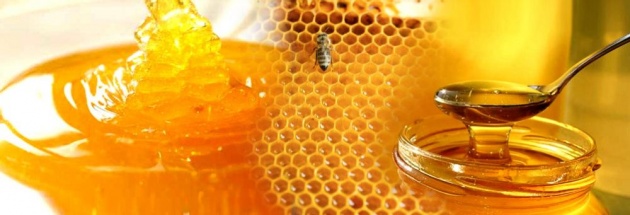
Why is honey so great? Well for a start, it’s one of the few foods that is good for us as well as being tasty! However I will begin with a quick explanation of what it actually is (bear with me if this is painfully obvious). Bees produce it from the nectar inside flowers (this process is incidentally also responsible for the pollination and reproduction of plants). They collect the honey and store it in the honey-comb inside the beehive, and through the beating of their wings, remove much of its water content.
This magic substance has existed for millions of years, and has been used by humans pretty much throughout history, for both its health benefits and as a culinary delicacy (primarily among the wealthy as it was so expensive). The golden stuff appears in the Bible too, which waxes lyrical over its benefits on more than one occasion. It has also been used consistently throughout history to embalm the dead, a process called mellification. Among others, Alexander the Great was apparently mellified, so if it was good enough for him…
The English term ‘honey’ has Germanic roots, while the romance languages terms (French: ‘mile’, Spanish: ‘miel’, Italian: ‘miele’) stem from the Latin ‘mel’. But what all these languages have in common is the term ‘honeymoon’ which is always represented by a direct translation (‘lune de miel’ in French, and so on…), demonstrating that honey represents the sweetness of the beginning of marriage in numerous different cultures.
The many benefits of honey
It has a great number of culinary uses – I’m not going to go into all of them, but as well as a spread for bread or toast, it is used as a central flavouring ingredient in many dishes all round the world. It is also commonly used in teas, and alcoholic drinks. Mead is an ancient form of honey wine which has existed in various forms all over the globe since the beginning of human existence. Viking blood is a mixture of mead and cherry juice.
The obvious one is that it tastes bloody nice! While the delicious sweetness appeals to most of us like with sugar, it has a great depth of flavour too. These flavours vary with the myriad different types of honey.
It never goes off – bacteria can’t live in it due to its low water content and relatively high acidity. Thus it’s pretty much the only food that will last forever! So you don’t have to keep it in the fridge! In fact, I’d recommend that you didn’t, as when it is cold, you don’t experience its full range of flavours.
Honey increases your athletic ability. Studies have shown that it is just as effective as the synthetic commercial energy gels for providing the body with energy, but it obviously comes with numerous other benefits too, including anti-inflammatory properties. Unlike many other simple carbohydrate energy sources like sugar, it doesn’t cause hypoglycemia which is the fancy name for that sugar-low often experienced straight after the short burst of energy provided by sugar. Therefore it provides longer lasting energy than most of these products on sale in sports shops. It is also considerably cheaper.
The health benefits of honey are numerous and well documented.
It is a natural antibiotic.
In the past people would put honey on wounds, fungal infections, bite, infections, burns. It releases hydrogen peroxide which is a natural disinfectant: therefore it kills bacteria. Its antibiotic properties also mean it can be used to lessen the effects of acne.
It provides a moist barrier over wounds too.
This encourages healing without allowing cross-infection, and also means the removal of wound dressings are far less painful and damaging. Thus it can help prevent scarring. The glucose in honey combines with protein tissue, so this property too means less scaring.
Its moisture giving properties make it popular for cosmetic skin products and sun creams, as it is thought to prevent the signs of aging.
It’s known to lower cholesterol, and helps your digestion. This is as it improves intestinal health so the cells which you need to digest function more efficiently.
If you eat local honey from local flowers, you should see a decrease in hayfever symptoms (if you were already a sufferer!).
Honey is a natural antioxidant.
This means that it helps combat the oxidation of molecules in the body which creates harmful ‘free radicals’, through the transfer of electrons. Free radicals occur naturally in the body but are increased by external factors such as pollution. They promote many degenerative conditions such as cancer, heart disease and alzheimer’s. Antioxidants help the body remove these unwelcome molecules, thus honey helps prevent many of these diseases. In general, the darker the honey’s colour, the higher antibacterial and antioxidant content it will possess – Manuka Honey is one of the best.
One of the most widespread health benefits of honey is a cough and sore throat remedy.
As well as killing the bacteria which you will be harbouring during a cold, honey is very soothing and warming. A ginger and honey infusion with lemon is a very effective sore throat remedy.
However, honey bees are endangered in many places in the world. Primarily because of insecticides and other chemicals used in commercial farming, bee colonies are dying out. This couldn’t just mean the potential end for honey, which can only be produced by bees, but also would be massively destructive for whole ecosystems.



